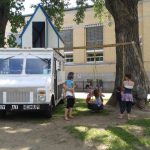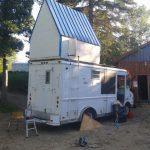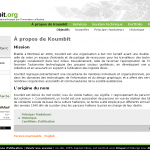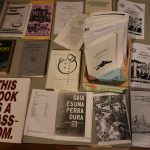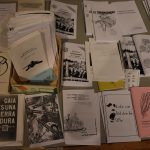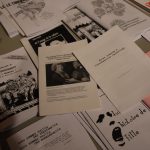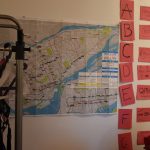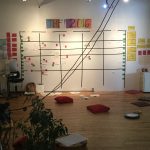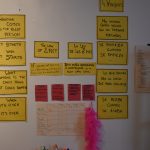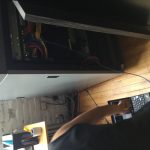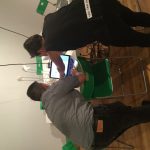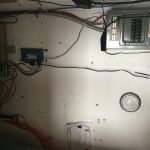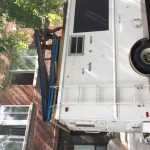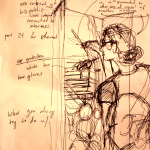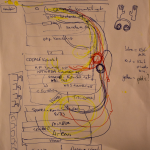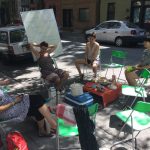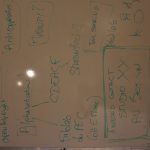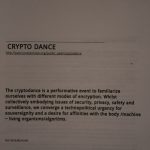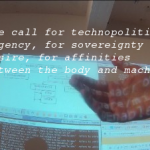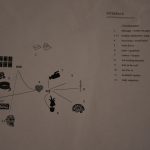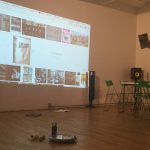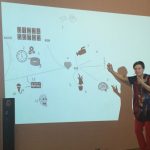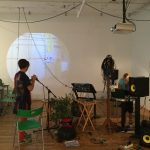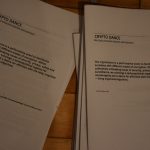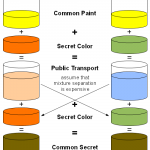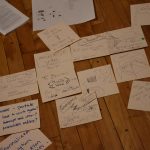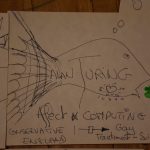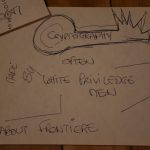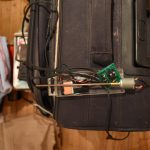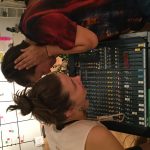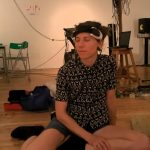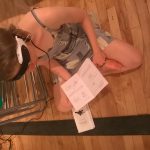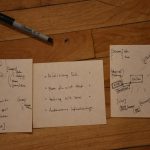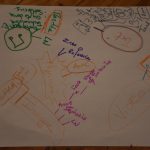Summary of THF 2016
TransHackFeminist! is an annual convergence of queer feminist and visionary hackers.
The third iteration of the THF! was held on unceded Kanien’keha:ka (Mohawk) territory (Tio’tia:ke a.k.a island of Montreal) from August 18 to 22, 2016. The previous two THFs were held in the post-capitalist eco-industrial colony called Calafou (Catalonia) in 2014 and in Puebla, Mexico in 2015. The historical intentions behind the THF! are multifold. The event aims at addressing the lack of women, queer, trans and diversity in technological fields in general and hacking more specifically. But even more so, it aims at creating a community that critically assesses the hegemonic narratives around technologies, the modernity aspects of its underlining Western assumptions and its inhenrent capitalist inflections, among others.
This year, THF! focus on four main themes, namely: the decolonization of technology, infrastructure autonomy of queer and feminist pedagogies, and Hacking with Care.
This THF! edition followed an open space technology** methodology to organise collectively its daily agenda. Since organising started online, participants were encourage you to send your proposals of talks, workshops and activities, with your needs (material, space, etc.) early on.
The THF! is guided by a community agreement*** and follows “HackingWithCare” and “chill hacking” principles, which give attention to individual and collective care, needs and time. Moreover, we believe that theoretical understandings are not subordinated to the practical requirements of computational protocols. In both our practice and conceptual framwork we embrace ambiguity, malleability, messiness, and unknowability, among others.
This year the THF! focused on four main streams, namely: Decolonizing Technologies, Autonomous Infrastructures, Queer and Feminist Pedagogies and Hacking with Care.
THF is a self-organised event that works on a budget of $0. This means there is no audience, only participants that contribute to its content, the resulting conversations, its dynamics, and logistics. We do things together, this is our expertise, our food was organised as a potluck.
One friend took care of a lots of cooking. Additionaly, participants brought a dish and/or a drink to share.
Decolonizing Technologies
For THF! 2016, we take as a starting point the assumption that colonialism has invaded and embedded the digital realm and our technologies in general. Jodi Dean calls part of this process “communicative capitalism,” Ulises Mejias warns us how the network broadens participation yet also exacerbates disparity, increasing exlcusion rather than inclusion, Nicole Starosielski talks about the inherent and continuous colonial relationships embedded in the undersea cables, meanwhile we are reminded of the materiality of technologies in Parks’ and Starosielski’s work: Signal traffic.
How then can we imagine the decolonization of technologies and of cyberspace? What would such processes, epistemologies, and practices entail? How can feminist anti-colonial, post-colonial, and/or indigenous frameworks shape and strengthen our analysis in our collective reflection on such questions? At the methodological level, can radical speculative fiction or storytelling a la Octavia’s Brood (2015) help us produce our vision(s) of decolonized technologies? In this stream we will explore the intricacies of colonial technologies while at the same time trying to conceive what decolonial technologies mean.
Autonomy of Infrastructures
While we recognise that no infrastructure can be fully autonomous, since autonomy is relative and as they depend, for instance, on already existing communication networks and technologies designed by mainstream companies (such as computers, servers, undersea cables, and access devices), what does it mean for us to conceive and use autonomous infrastructures? Such infrastructures may be diverse in scope and in shape, but they seem to share a desire to create the conditions for their autonomy in terms of their governance models, the values they embrace and the principles they promote. What then are these values, how can we make sense of them and put them in practice? In this stream, we would like to explore the very concept and practice of autonomous infrastructures. What are autonomous infrastructures ? Are there differences between the “Global North” and “Global South” in their understanding of autonomous infrastructures? Is hacking technological system(s) and communication networks from within also considered autonomous infrastructures?
Queer, Feminist and Anti-Racist Pedagogies
What are the queer, feminist and anti-racist pedagogies that inform our work? How, in turn, are theses pedagogies informing and shaping the direction of our queer, feminist and anti-oppressive hacker movement? What are the relationships between queer, feminist and anti-racist pedagogies and the technologies we aim at using and creating (whether decolonial, autonomous, transfeminist, etc.)? What differentiates the pedagogie(s) we embrace from the pedagogies of other hacker culture(s)? What is the significance of using such pedagogies in our work? This stream will allow us to question, deepen and share such pedagogies. Our ultimate desire for this stream is to start the co-production of a manual about what we mean by queer, feminist and anti-racist pedagogies. Such a manual will be invaluable for our work (teaching FemCrypt, gender and tech institutes, etc.). Clearly articulating the pedgaogies that sustain our work will help us take stock of where we are, who we are and where we want to go.
Hacking with Care
The issue of care is central for and integral to queer, feminist and anti-racist hackers. In this stream the concept of hacking with care is understood as a practice which foregrounds the art(s) of well-being as powerful means to encourage, mirror and sustain connexion to ourself, altruism, and to embody a web of trust. With Hacking with Care, we wish to contribute to the resiliency and “prosperity” of what we see as an extended network of caregivers: hackers-activists, lawyers, journalists, artists, whistle-blowers, and many others with or without a “profession” or a “name”, distant and near, free and imprisoned, each and everyone of us a node in this human support network. We would like to include activities for reimbodiement and mindfullness, with chilling and resting area, exploration in nature, massage workshops and cryptodances.
THF!2016 took place at 6 differents locations :
a: Studio XX
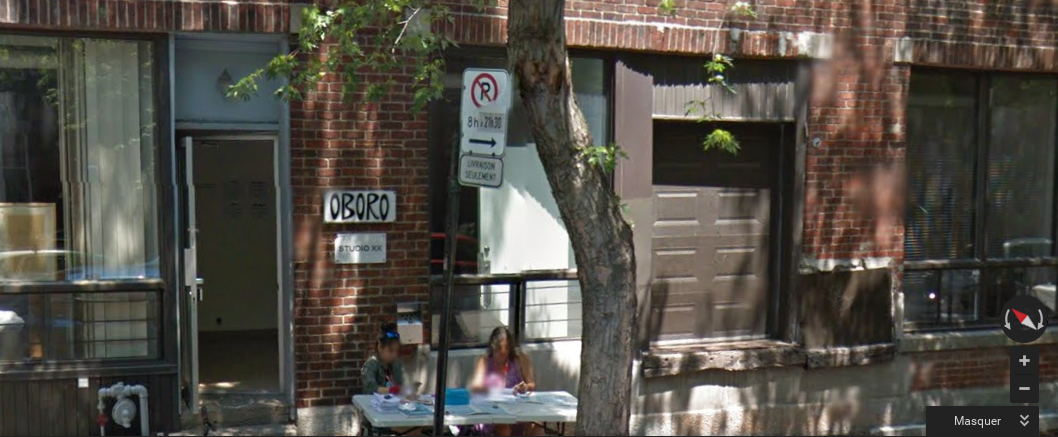
Founded in 1996, Studio XX is a bilingual feminist artist-run centre for technological exploration, creation and critical reflection. XX supports independent media arts production and offers a platform for a multiplicity of territories, voices and creative actions by artists who identify as women, trans or dissident in the contemporary technological landscape. Demystifying, providing access, equipping, questioning and creating, these are the aims of Studio XX. We actively participate in the development of a digital democracy that encourages autonomy and collaboration.
b: The Service Truck
The Service truck is a Grumman 1974 (old milk truck, with Manual Transmission, a mobile structure aiming at framing the unpredictable. The Truck is White, with spaces painted as blackboard : It s an invitation to leave words there. On the top of the truck,a house to receive powernaps, gazing moments. The interior of the truck was redesigned as an office and place of life. To live, work or receive anybody on board. The structure is there, the rest will be structured (Truck), (action / non-action). The place and the moment will guide the action Driving the streets aboard the truck, becoming aware of the spaces. Borrowed from everyday life such as a conscious wandering from a point of departure to a point of arrival that remains unknown until the end. The truck provided services from one location to another as required by the moment.
c: Koumbit data center
Koumbit is a not-for-profit organisation founded in Montreal in 2004. Membership in Koumbit is open to individuals and organisations that share Koumbit’s values (Horizontality, Freedom and Solidarity). Koumbit primary activity is providing web services, including designing, developing, and hosting websites. This work is done by around twenty Koumbit members, who belong to the Conseil de Travail (Council of Workers), which is organized according to the principles of non-hierarchical self-management.Koumbit is a proud supporter of community groups, organisations, and activists, both locally and internationally. Our technological choices are adapted to the needs of these groups, and built entirely using free and open source software.
d: Qpirg Concordia
The Quebec Public Interest Research Group at Concordia is a resource centre for student and community research and organizing. We strive to raise awareness and support grassroots activism around diverse social and environmental issues. Our work is rooted in an anti-oppression analysis and practice. We seek to make campus-community links and inspire social change through engaging, inclusive and non-hierarchical approaches.
e: The tent (studio xx corridor)
Inspired by politics and care and hacking with care practices of settling a tent in public event, this space aims at providing a space for resting, sleeping, cutting from the intensity the larger world, doing nothing. Eventually, the tent was used for more intimate private calmer sessions or workshops
f: Casa Obscura
Casa Obscura is a multidisciplinary art workshop based in Montreal, Quebec, and managed by the Amicale de la Culture Independence, a non-profit organization whose mandate is to promote culture. Founded in 1993 by independant artists, such as film makers, musicians and activists , Casa Obscura hosts exhibitions, concerts, musical improvisation workshops, live modeling workshops, Libraries), as well as other artistic and political activities.
+ a zinotheque
= Thursday 18th =
1. Opening
Question posed: What is transhack feminism? Anne starts the introduction to the event with that being a question, that it has started in Spain. It is not just about trans people or feminism, main focus on hacking. [M. do you have things to contribute, you were in Calafou. She does not have much to say] Showing the agenda, describing openspace technology
One big thematic is “hacking with care” so there is the chill zone, the chill hacking for napping, taking care, etc. There is also the truck…Mag. notes it will need We also have no internet! That is also a thing people will be working on this morning
In the spirit of the participatory event, lunch is participatory, potluck lunch — can buy already made food if we want If you feel you want to contribute to the very small budget of the THF there is a very small donation box There is a beautiful map from far away for understanding Montreal — the park is going to be a space where we can meet if it is sunny there Talks about other spaces for meeting: QPRIG and consent for men, while wely wely want happens here, also event at casa obscura,
goes on to explain the 4 principles
- Whoever comes is the right person. Thematics in the call, downsizes trolls, people who are just here to argue
- It starts when it starts
- What happens is the only thing that could happen
- when it's over ... it's over
The law of two feet: “if you are not learning nor contributing,
Different roles [3] — person who hosts should think about documentation and who can do the documentation
1. Subject maintainer
2. Note taker(s)
3. Dynamic Waver
3 Tips:
1. Be brief and direct
2. Attack Ideas not people
3. Welcome diversity (it makes the subject richer)
After talking about documentation, the non-working Mac that is here for everyone, the possibility of hacking the Mac machine and bootstrapping it with Linux, Anne sits down and opens the floor for introductions,
- Give pronoun/name
- How are you feeling?
- What you need?
the 9 of us introduce ourselves
Anne starts going over agenda, that we will add things, that we might adjust the times/timing Also that there will have tasks that are disaggregated, etc.
more here : http://anoia.tachanka.org/mediawiki/index.php/Open_Space_Technology_%26_Setting_the_Tone
2. Fix it together morning (Studio XX )
Fixing things together has been a beloved femhack activity, in accordance with Do It Together practices.We had to start the THF with a few fixing activities.
a-Fix the INTERNET
The day before THF started, a major electricity stroke the city. Intertweined with this power cut, “the internet” was not working.
b.fix the PRINTER
A printe was given to us a few days before the event. We had to play around with propriereratory drivers in order for her to work.
c. Build the HOUSE on the TRUCK
One of the participant came and contributed to the space with her Service Truck. It s a traditional Milk truck that was transformed into a workspace, a small studio welcoming different forms of relational art and performative actions
One mission of the Truck is to take back the streets. The Truck can also be used as a workspace, a rest room, a massage, a meeting place, a gazing place.
3. Playing with (Epistemic) Power: A Workshop on Critical Scientific Literacy (Studio XX )
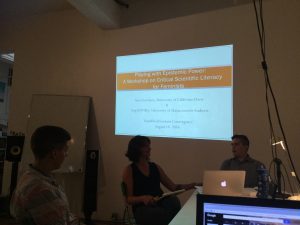
This workshop emerged from the presenters’ shared recognition of a need for greater scientific literacy in women’s studies, the humanities in general, and in the academy at large. Alongside this need, the presenters recognized the dangers of a “scientific literacy” frame divorced from the critical interventions of sciencestudies, including the sociology, philosophy, and history of science. They envision a feminist professoriate and student body competent toengage scientific stories in their teaching, learning, and ineveryday interactions with breaking scientific news, medicalexpertise, and casual explanations for difference. This workshopemerged as an attempt to create practical and accessible training infeminist science studies, training in a skill set we call “criticalscientific literacy.” They imagine this skill set being put to usein curricular, community organizing, and other contexts, far outsidethe scope of “science studies.” They aim to offer resources forresisting the pro/anti science frame that has so powerfully dominatedthe contemporary political landscape, disciplinary and otherwise. The two presenters are trained in feminist theory and neurosciencerespectively and have collaborated as activists and in research and curriculum development for many years. Their work on criticalscience literacy draws on work in feminist science education andscience literacy more broadly such as that by Angela Calabrese Bartonand Matthew Weinstein. Together – and in dialogue with othercolleagues and students – the presenters have developed a workingmethodology for unpacking and reframing scientific stories. It is amethodology that resists a nature/culture framing that encourages usto read scientific truth claims as true or false, biological orsocial. Instead, it insists on curiosity, imagination, and politicalaccountability as core facets of a critical approach to science withthe potential to bring into being new knowledges, and in so doing,new worlds.
The presenters gave an account of their collaboration and how it informs theirapproach to critical science literacy and then lead an interactiveworkshop that will prepare participants to engage scientific storiesdirectly, in their teaching, research and everyday life. They described the path that scientific results take from lab bench to popular news article and explain how to use this understanding to back track from popular news to the original primaryscience publications of a laboratory. In the first activity,participants will work through a model scientific article in groupsto learn the methodology. Groups will learn to find the scientificpublications on which a particular pop culture or news mediareference is based, read and understand its “results”, andgenerate questions that call attention to the cultural, economic, andpolitical frames of reference that make the funding of the questionat hand seem logical. They will produce scientifically literate assessments of the claims that do not resort to dismissal of scienceout of hand or to the separation of good and bad science as biasedand objective, respectively. Instead, they will practice usingcritical science literacy skills to explain how we know what we knowin ways that blur the line between critique and knowledge production. Following this initial activity, participants will outline the stepsnecessary to apply the skills to an article of their choice thatrelates to a teaching or research topic. Participants will be givenresource sheets to help them repeat this methodology on their ownoutside of the workshop space as well as an invitation to participatein a blog project to discuss popular science news as it is publishedas a project in active critical science literacy.
4. Data Center Visit (Koumbit)
5. Cryptodance workshop (Bullionie)
preparing he cryptodance 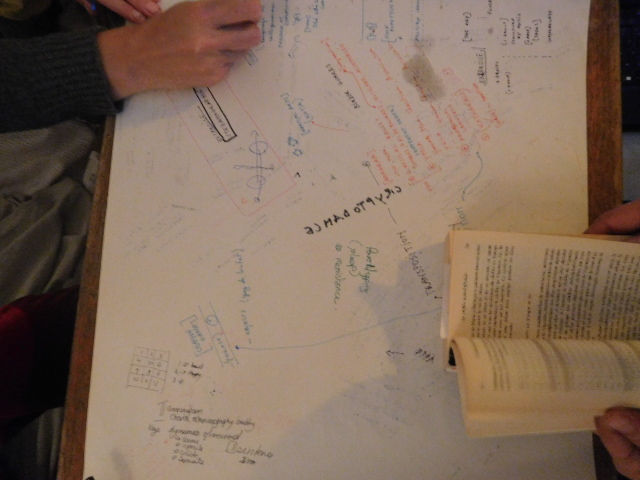 The cryptodance is a performative event to familiarize ourselves with different modes of encryption. Whilst collectively embodying issues of security, privacy, safety and surveillance, we converge a technopolitical urgency for souvereignity and a desire for affinities with the body /machine~ living organisms/algoritms.
The cryptodance is a performative event to familiarize ourselves with different modes of encryption. Whilst collectively embodying issues of security, privacy, safety and surveillance, we converge a technopolitical urgency for souvereignity and a desire for affinities with the body /machine~ living organisms/algoritms.
Cryptodance was developped, in august during the preparations of THF 2016! by an international small constellation of choreographers, hackers, dancers, ….
They met, discussed and wrote a choreography combining dance annotations, crypto technics and carefull somatic tactics. Goldjian and bolwerK started plotting the Cryptodance project during a Ministry of Hacking (Esc, Gratz, Austria), where they formed joint(ad)venture of the departement of Waves and Shadow and The Departement of Care and Wonder.
= Friday 19th =
6. Breakfast Assembly
Breakfast Assembly : Every morning from 9:00 to 10:00, at the studio XX (4001 Berri): A collective meeting allowed us to introduce ourselves, our interests, our feelings of the day, our needs, and propositions. While some activities are already on the calendar, the day’s program will be created each morning and collectively modeled with new connections. We will follow the OpenSpace Technology method to produce an emergent collaborative and self-organised event.
7. Wely Wely Want (StudioXX)
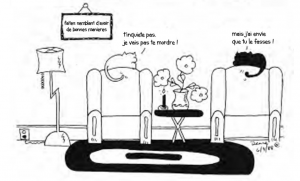
Workshop for people identifying as women, trans, queer, dykes.
This workshop is for people identifying as women, trans, genderqueer, dykes and women (The description was given in french, the workshop was give with whispered translation)
A workshop to talk about sex, physical contacts and relationships, whether in a loving setting but also friendly, coloc, collective, affective in general. In short, of our everyday life with others, what …
We make the observation that the models we have for our relationships enclose us in tricks that rarely suit us. The model of the silence according to which one is supposed to look in the eyes and suddenly to understand all the secrets desires of the other. Assumptions, believe that others are known by heart. And then the pressure shots we put on, because if we are really friends, we owe it to ourselves, or because nevertheless, it is necessary that the collective turns. The common scenarios with which if nothing is said is for sure, everything takes place in the order imposed with all the mandatory steps, first kissing, then hand under the tee-shirt, and then one Can touch the buttocks …
All these presuppositions, these evidences, are the breeding ground on which situations of shit develop: the misunderstandings, the unspoken, the misfires, the malaise, even the aggressions. And when one hears of the word consent, it is often only when a limit is exceeded or an abuse is denounced.
We want to imagine and create more satisfying models, to move towards more fulfilling relationships, to admit what we really want to share and discover unsuspected pleasures. One wants to conceive the idea of consent as a positive, constructive, daily and even funny, pleasant, even terribly sexy practice.
In these workshops, we want to share, exchange our experiences to progress in our practices, find each one of the tracks adapted to our lives and our desires. We want to offer a space to step back on our usual interactions and see a bit what is going on and we will not.
Ideally, with these exchanges, it becomes easier to revisit our difficulties and the situations where we really shit, to dedramatize them without minimizing them, to be able to talk about them, to work on them, to move forward. Let it become simpler also to identify our desires and express them, make proposals and respond to them, and find ways that suit us to say our limits and feel comfortable with.
We are a group of feminists who want to work on these issues through workshops in the form of games and exercises. Of course each determines what it wants to share with other participants and the idea is to create together a frame of non-judgment, where one speaks from oneself and one’s own experience. These proposals for collective moments are composed of small playful, verbal or bodily forms, with periods of reflection, times of exchange and experimentation, alternating moments alone, in large groups and in small groups.
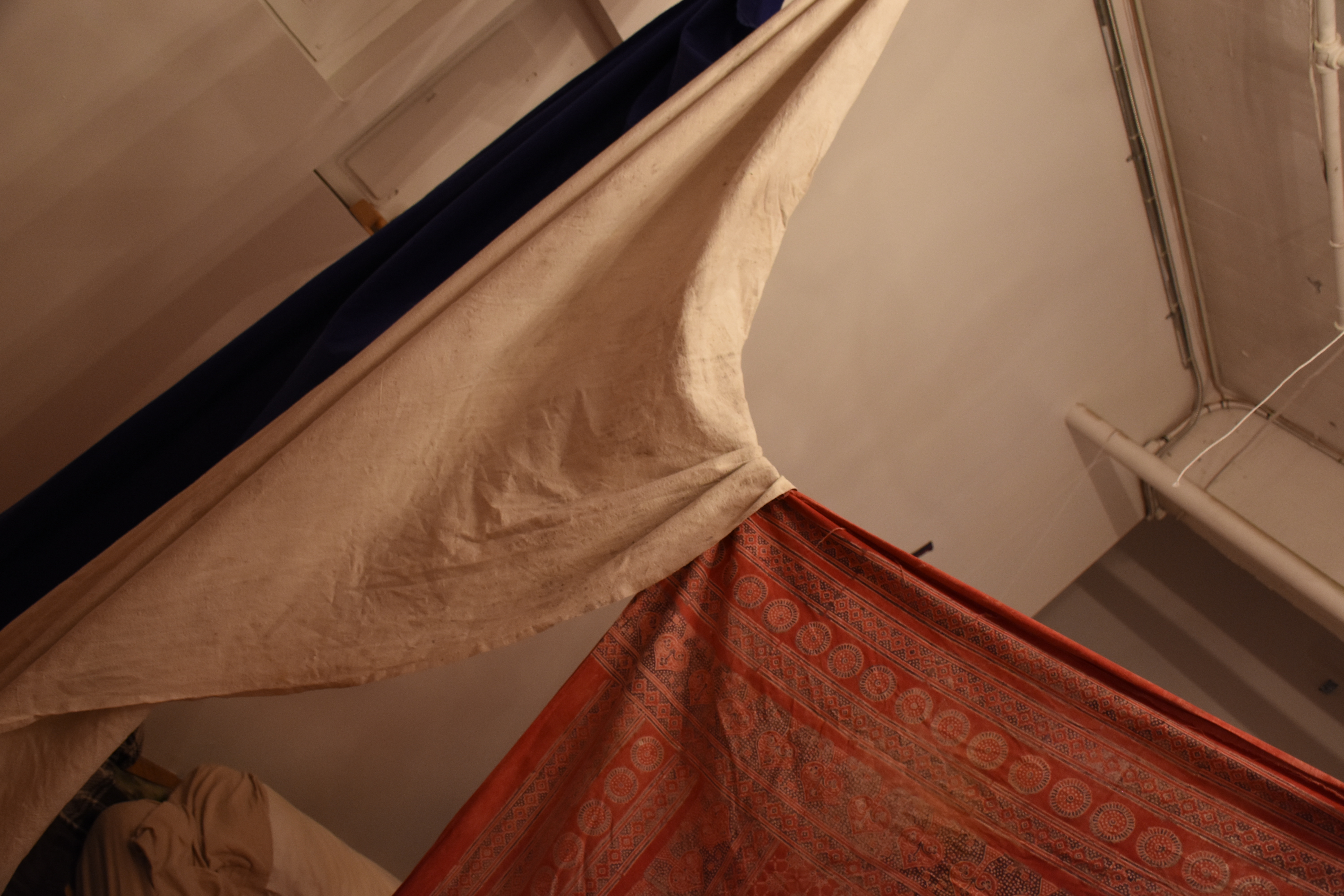
8. Masculinity and Consent (QPIRG )
This workshops facilitated discussion and activities about consent for people who identify as men. Participants talked about how to practice good consent as well as other ways that our behaviours can support – or undermine – consent, accountability, and allyship. The discussions focused on how people who have experienced male privilege practice consent and deal collectively with issues related to consent.
9. Decolonizing Technology (Truck)

Discussion in the truck
We take as a starting point the assumption that colonialism has invaded and embedded the digital realm and our technologies in general. Jodi Dean calls part of this process “communicative capitalism,” Ulises Mejias warns us how the network broadens participation yet also exacerbates disparity, increasing exlcusion rather than inclusion, Nicole Starosielski talks about the inherent and continuous colonial relationships embedded in the undersea cables, meanwhile we are reminded of the materiality of technologies in Parks’ and Starosielski’s work: Signal traffic. How then can we imagine the decolonization of technologies and of cyberspace? What would such processes, epistemologies, and practices entail? How can feminist anti-colonial, post-colonial, and/or indigenous frameworks shape and strengthen our analysis in our collective reflection on such questions? At the methodological level, can radical speculative fiction or storytelling a la Octavia’s Brood (2015) help us produce our vision(s) of decolonized technologies? In this stream we will explore the intricacies of colonial technologies while at the same time trying to conceive what decolonial technologies mean.
NOTE : En: This pad pay homage to Antonieta de Barros. Antoinieta was the first parliamentary black woman in Brazil in 1934. Born and raised in Santa Catarina, she was an educator, journalist and political, breaking stereotypes linked to gender, ethnicity and social class. We recognize that as other black women, Antoinette was not recognized for her work, we want the flagships honor her. http://vedetas.org/
Full report here: http://anoia.tachanka.org/mediawiki/index.php/Decolonize_technologies
10. Technolibre !
audio report: https://soundcloud.com/user-762943871/technolibre-intro
11. Cryptodance 3pm,(studio xx)
https://archive.org/details/cryptodance
video : https://archive.org/details/cryptodance
12. Soldering workshop (studio xx)
discussion in preparation of the soldering workshop
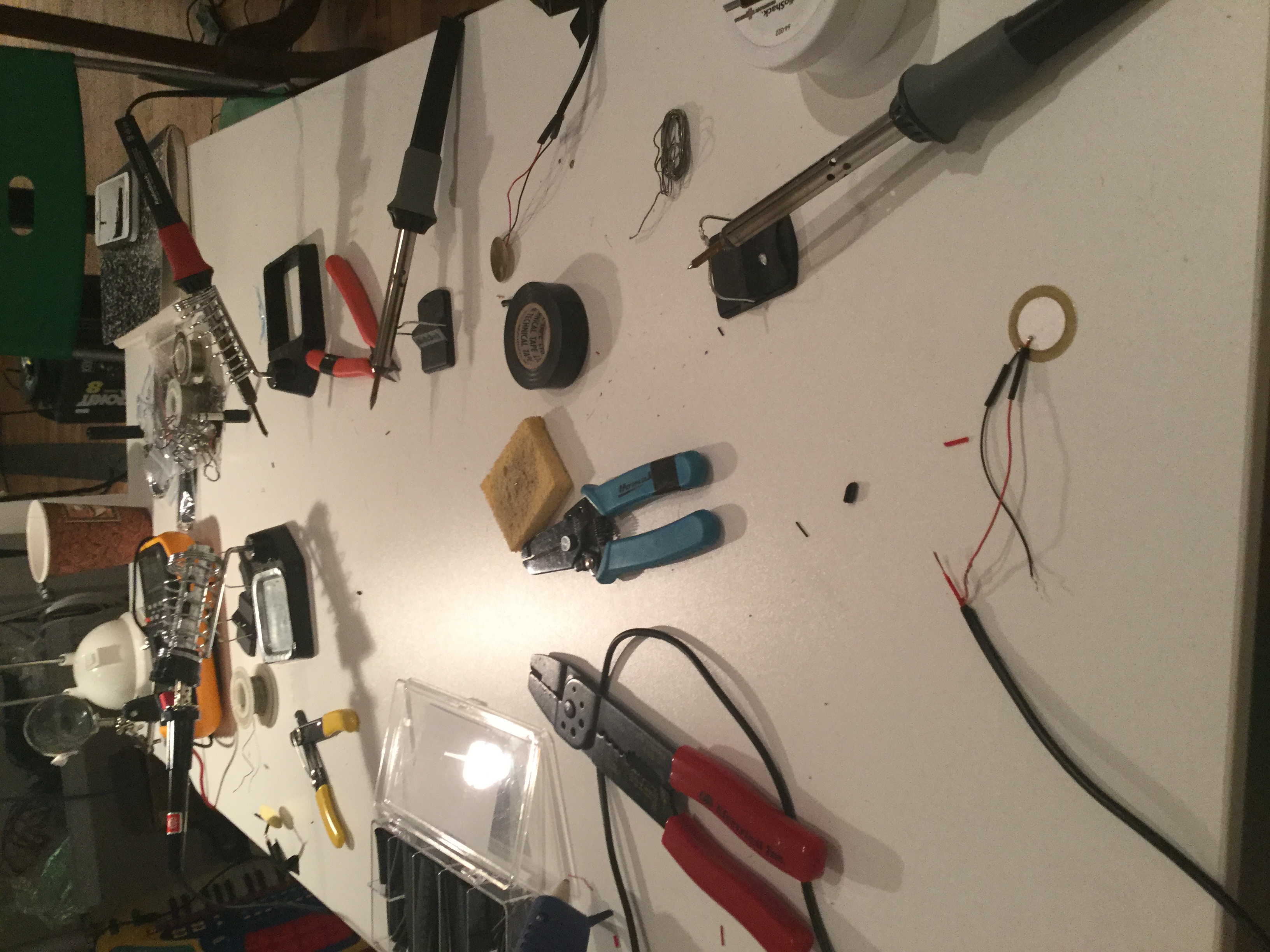
[I think there should be some explanation here for the documentation. There is a speicific intention behind this workshop and the discussion.]
13. Sonic explorations (Studio XX)
14. Somatic touch / touching and being touched (Studio xx)
15. Politics and Care (studio xx)
Politics & Care is a space to weave links between collective wellbeing, care and politics. All that with a little bit of magic! We are a collective of artists-community organizers (intersectional feminisms and indiscipliné-es!) dedicated to integrate care in our politics. We hold collective discussions and facilitate workshops for community organisations and more.
Formed in Montreal during the 2012 student strike, Politics & Care look at care as a collective issue.
Pushed by a society that is always running, too often we’re trying to be as efficient as possible while working towards social change. Another protest, an extra meeting and, why not one more conference at lunch time. We fight for social justice… until we break down. And even then, we feel guilty for not doing, and being, “enough”.
The collective care spaces are an occasion to reflect on collective well-being, emotional labor and self-care, to share stories, ideas and practices to create accountable, sustainable and thriving communities. They are the moments to start thinking about what our needs are surrounding those issues, and to take charge of the strategies that are already in place or could be implemented regarding collective well-being and self-care.
Too often, we do not take the time to question our limits and the emotional involvement that is intrinsic to activist work. We tend to stretch ourselves thin and to not take time to care for one another. How many people around us burn out, are depressed, or completely overwhelmed by everyday struggles and family life?
Thus we need to open-up a space to discuss and think about collective well-being and emotional labor in our communities. Emotional labor (active listening, acting as confidants, confidentiality, support work, mediation, defusing tensions, worrying about people being comfortable in new spaces and much more) is almost invariably seen as being within the realm of “emotions” and arbitrarily disconnected from the political, and therefore erased from our work, and consequently not valorized. However, this work is integral to sustainable collective action and movements that cease to reproduce systemic oppressions and violence that structure our lives. Acquiring tools and actively engaging with ideas about self-care and collective well-being are powerful ways to contribute to creating social justice.
= Monday 22th =
16. Feminist Servers (Studio XX)
3 locations coming in on uberconference cause meet jitsi was going bad 🙁 -Graz – esc, http://esc.mur.at/en/projekt/zerstoeren (destroy: project for the fall at esc) -Calafou – anarchaserver space (http://zoiahorn.anarchaserver.org/) -Montrea and On the roof of the server in Calafou.
Full report is here : http://anoia.tachanka.org/mediawiki/index.php/Feminist_Servers
17. Closing (studio XX)
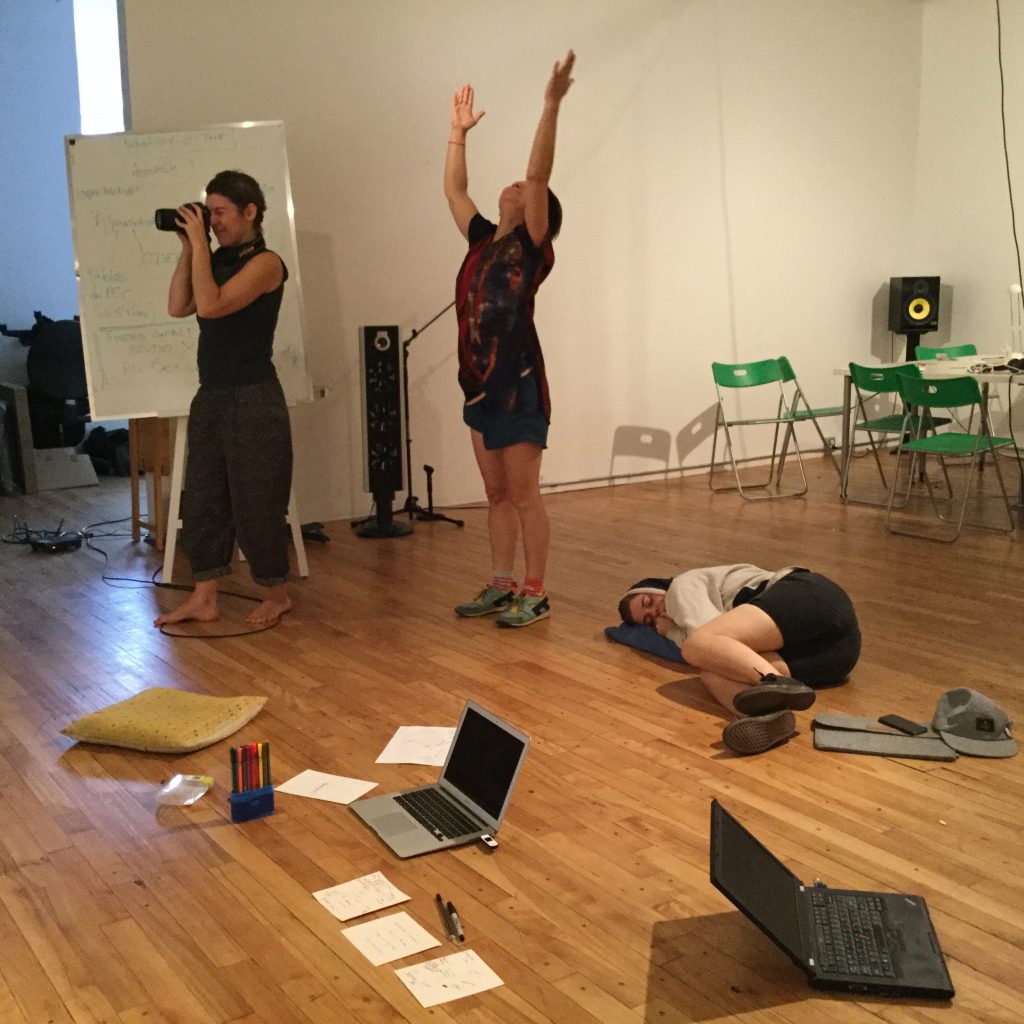
18. Documentation blitz (Studio XX)
19. Écriture visionnaire (visionary writing) (Casa Obscura)
This was workshop and open discussion on visionnary writting. In this workshop participant tryed to investigate the power of utopian thinking, dreams and visionnary poetics and to find new narratives that might be more “opening” and less oppressive for ours collective and indivudal identities – new narratives to live and relate to each others.
The discussions and writting exercises were mostly related to three ”axis” : 1. Utopia as an horizon, 2. Writting as a way to act and 3. Tales of an “otherwise”
20. Improv night at Casa Obscura
Bringing together instruments made, repaired, and carried through the THF! [as well as our own voices] we made a collective participatory event.
Do we have sounds, or images from that ?
[IT’S A MIRACLE! Apparently many of my photos were on a different device — not my camera. I have a few images of this as well as the picnic beforehand]
= Reflexion =
- Hosting
- Communication
- Participation
- Ressources
- Sharing / decentralisation
- Documentation
- Memory vulnerability

